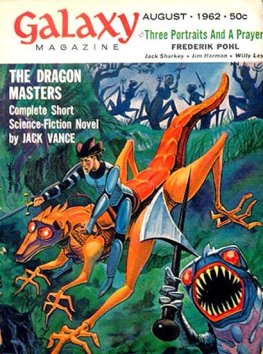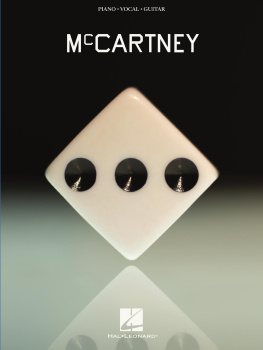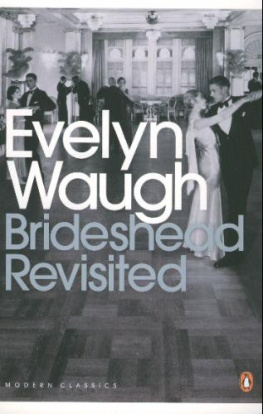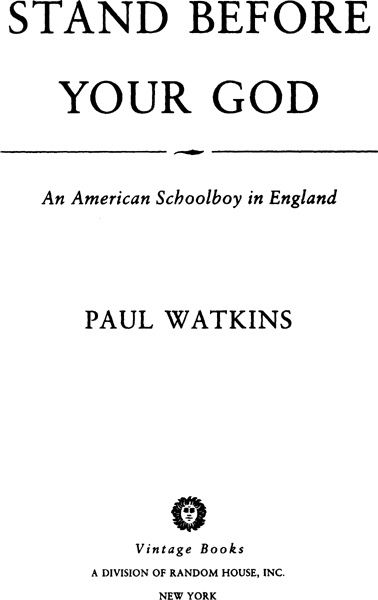Acclaim for PAUL WATKINSS
STAND BEFORE YOUR GOD
As readers of his novels might expect, Watkins offers wonderfully lucid prose; clear and evocative, it lets us know not only how it felt for him to be a seven-year-old away from home but also how it looked, smelled, and tasted.
Boston Sunday Globe
A classic. Watkins writes with breathtaking surrealism, clarity, and grace. Drawing upon his own years at two of Englands most exclusive boarding schools, he tapped into a vein of psychic misery lurking inside many an Englishman who endured that countrys thorny adolescent ritual.
New York Observer
Watkinss writing carries strong echoes of Hemingway. [Stand Before Your God] fascinatingly reveals the genesis of a determined and talented writer who is sure to grow in stature.
Sunday Telegraph
So traumatic was this experience that it clearly seared itself into Watkinss brain with the flawless clarity of a childs eye. All the detailsthe smell of loathsome food, the precise form of a threat from a ring-leading bully, the wild injustices of a closed societyare summoned up with riveting detail.
The Times (London)
Paul Watkins is the kind of literary boy wonder that Ernest Hemingway (to whom hes often compared) would either toast with a shot of absinthe or punch in the nose.
Avenue
A tautly written account of the physical and moral toughening Watkins experienced vivid details and strong emotion.
New York Magazine
Among literati he is already a legend.
Esquire
WORKS BY PAUL WATKINS
Stand Before Your God
The Promise of Light
In the Blue Light of African Dreams
Calm at Sunset, Calm at Dawn
Night Over Day Over Night
PAUL WATKINS
STAND BEFORE YOUR GOD
Educated at Eton and Yale, Paul Watkins has written five novels. His first novel, Night Over Day Over Night, was nominated for the Booker Prize. His second novel, Calm at Sunset, Calm at Dawn, won the Encore Prize. He lives in New Jersey, where he is writer-in-residence at the Peddie School, as well as visiting scholar at the Lawrenceville School.
FIRST VINTAGE BOOKS EDITION, MARCH 1995
Copyright 1993 by Paul Watkins
All rights reserved under International and Pan-American Copyright Conventions. Published in the United States by Vintage Books, a division of Random House, Inc., New York and simultaneously in Canada by Random House of Canada Limited, Toronto.
First published in the United States in hardcover by Random House, Inc., New York, in 1994. Originally published in Great Britain by Faber & Faber Limited, London, in 1993.
The events described in this book are real, although the names and identifying characteristics of all students and faculty have been changed.
The Library of Congress has cataloged the Random House edition as follows:
Watkins, Paul, 1964
Stand before your God / a boarding-school memoir Paul Watkins.
p. cm.
eISBN: 978-0-307-76566-6
1. Watkins, Paul, 1964BiographyYouth. 2. Watkins, Paul, 1964Homes and hauntsGreat Britain. 3. Novelists, American20th centuryBiography. 4. Public schools, Endowed (Great Britain) I. Title.
PS3573.A844Z476 1994
813.54dc20
[B] 92-44885
v3.1
FOR LVH
Contents
ACKNOWLEDGMENTS

The author would like to thank the following: Amanda Urban, Jon Karp, Debbie Kwan, Heather Schroder, Jean-Isabel McNutt, Barry and Dini Goldsmith, Anne Seltzer, Peddie, and Lawrenceville.
ONE
I swear I thought I was going to a party.
I had a new suit made of blue corduroy and new black shoes that came with a free pack of playing cards. I was seven years old.
My father drove me to a house that I had never seen before. Mother refused to come with us. The last I saw of her was a tear-blotchy face staring down from the window of our room at the Randolph Hotel in Oxford.
The door to the house opened, and a man with a stubbly chin shook my hand. He led me into a room where dozens of other boys in blue suits and black shoes were playing board games and trading marbles.
Good-bye, my father said, and shook my hand. His face was hard and serious. He tasted the sherry that the stubbly man had poured for him. Then he put his glass down on a bookshelf and walked away from it.
I went around showing my cards to people. I said I knew some games. This place had a smell to itboot polish and old breadcrumbs and spilled milk gone sour and the flannelly warmth of our blue corduroy.
This is a neat party, I told the man. His hair was threads of black and gray. It looked sharp, like steel wool.
Did you say something? he asked me.
Wheres my dad? I flipped my cards from one hand to the other, hoping he would ask about them.
Hes gone. The man crouched down until I was no longer looking at the buckle of his belt but at his face. Your father has gone home. I am Mr. Vicker and I am your housemaster. From now on, you must call me sir.
I reached out and touched his hair, sure that it would cut my fingers the way paper can cut you.
He swatted my hand away and stood. The hard creases of his trousers fell back into their lines.
When can I go home? I asked.
You can go home in about three months.
Three months? His voice reached me as if it had been shouted into a canyon. I knew then that I had been tricked and that this was no party. I ran out to the road, through the part of the house where Mr. Vicker lived. This part had a different smell, of liquor and coffee and the sweetness of pipe tobacco sunk into the wooden floors.
The road was empty. The place where my fathers rented car had been parked was empty, too. It was so dark I couldnt see the tops of the trees.
I didnt know how to get back to the Randolph Hotel and imagined that my parents had already left there. They were on their way home to America. Between me and them lay a long thundering journey with only a little airplane window to look out of and clouds like a cauliflower jungle far below.
I tried to remember if my parents had told me Id be coming to this place. Perhaps they did. Most likely they sat me down and gave me a long talk, but I must not have been paying attention, because perhaps the television was on in the other room and I was trying to overhear the show.
I walked back into the house and asked Mr. Vicker, Wheres the ocean? If I could at least find the sea, I thought, there might be some ship heading home, and maybe if I scrubbed the floors and washed dishes, they would let me stow away.
Whenever I talked to grown-ups, I looked down at my feet. My mother had tried to stop me doing this, but I couldnt help it. After Id finished talking to Mr. Vicker, studying my new black shoes, I looked up. But he had walked off.
All of the parents were gone. Mr. Vicker cleared away the half-full sherry glasses.















